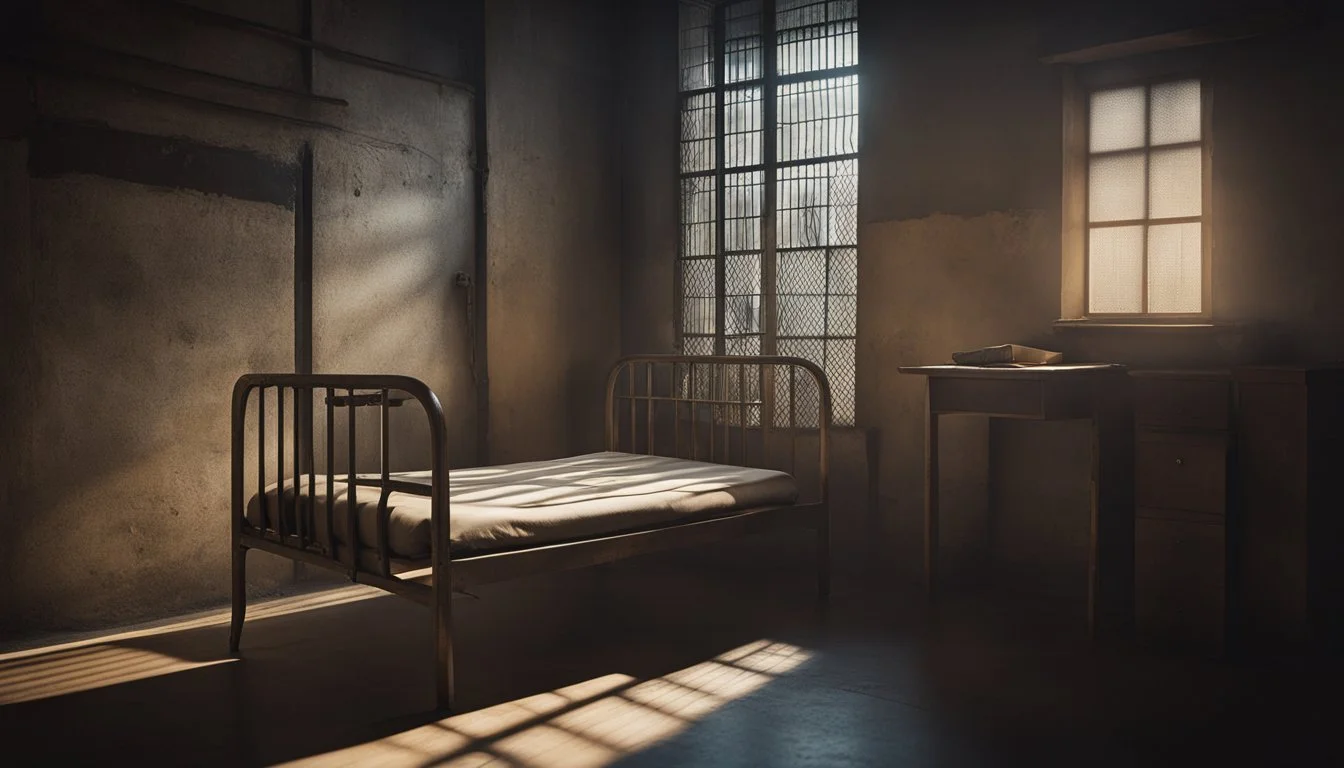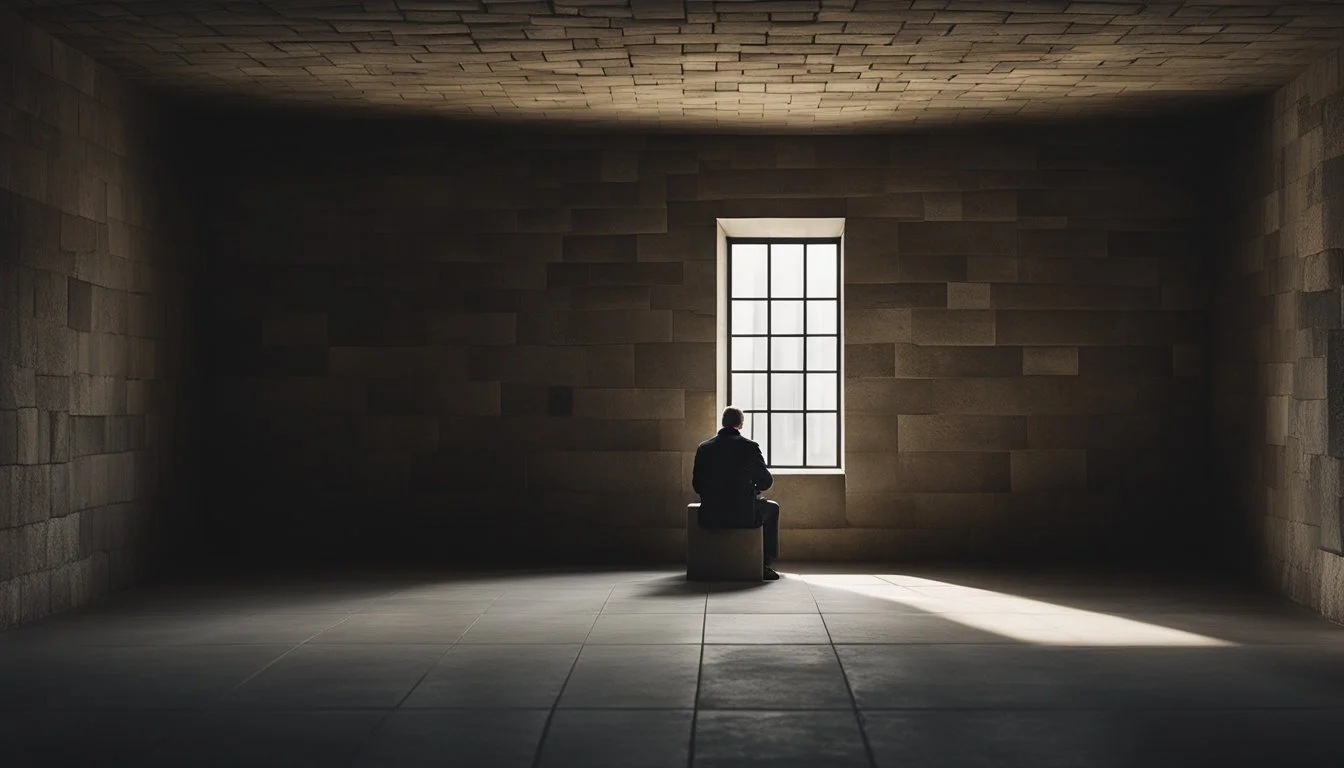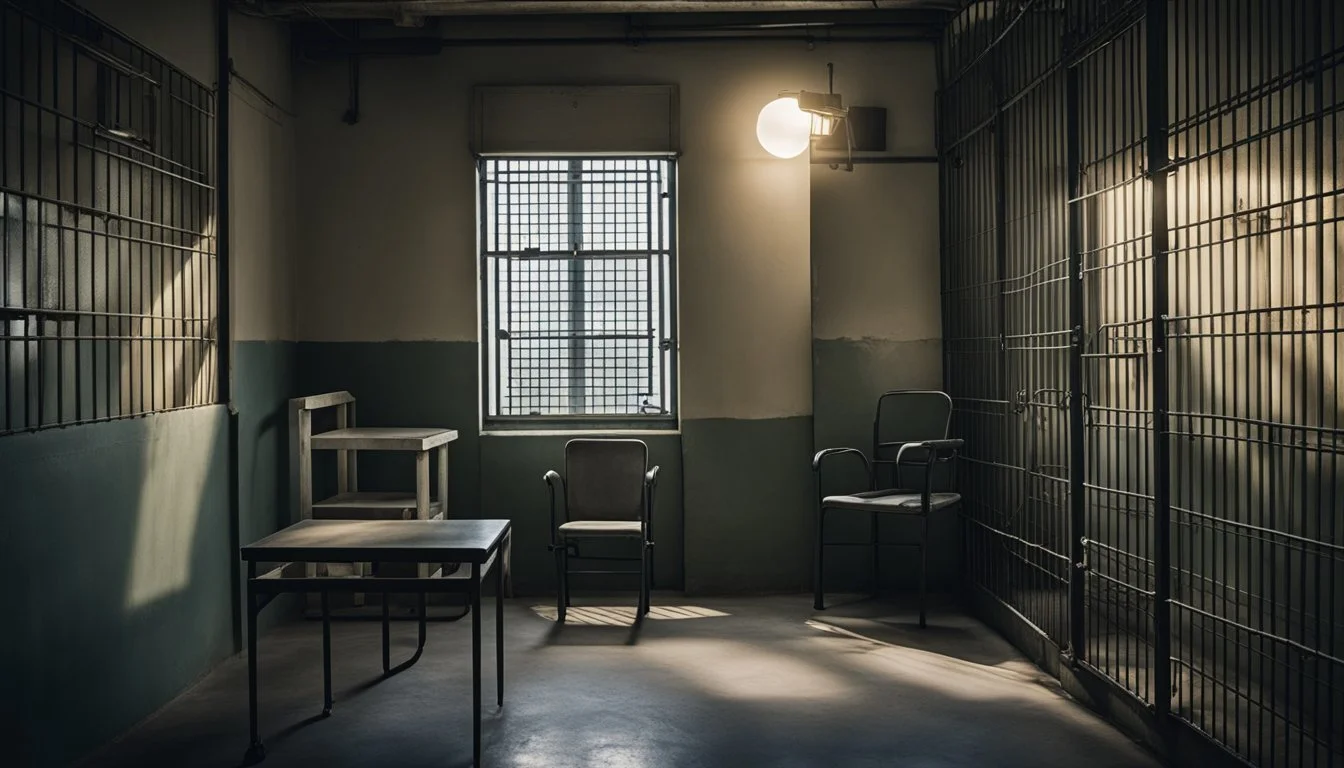9 Films About Political Prisoners
Essential Viewing for Justice and Freedom
Cinema has long been a powerful medium to explore and highlight social and political issues. Films about political prisoners offer insight into the difficult experiences of those imprisoned for their beliefs or actions against oppressive regimes. These films not only depict gripping personal stories but also reflect broader human rights struggles and historical movements.
By examining the ordeal of political prisoners, such movies shed light on the immense courage and resilience required to endure such circumstances. They provide viewers with a deeper appreciation for the complex dynamics between authority and dissent, showing how personal sacrifices can inspire significant change.
1) The Shawshank Redemption (1994)
"The Shawshank Redemption" explores the life of Andy Dufresne, a banker sentenced to life in prison for the murder of his wife and her lover. Although Andy's case does not involve political prisonerhood, his story delves into themes of justice, wrongful imprisonment, and resistance against an oppressive system.
Set in Shawshank State Penitentiary, the film portrays the harsh realities of prison life. It humanizes prisoners, showcasing their struggles and relationships. Andy's journey is marked with moments of profound hope and resilience, as he bonds with fellow inmate Red.
Throughout his incarceration, Andy maintains his innocence. He cleverly navigates prison politics, ultimately uncovering corruption within the system. His quest for justice culminates in a daring escape, highlighting themes of endurance and ingenuity.
For more information on "The Shawshank Redemption," visit IMDB.
2) 12 Years a Slave (2013)
"12 Years a Slave," directed by Steve McQueen, is a harrowing depiction of Solomon Northup's life. Northup, a free Black man from New York, was kidnapped in Washington, D.C., and sold into slavery in 1841.
The film, based on Northup’s 1853 memoir, showcases his brutal experience working on Louisiana plantations. Chiwetel Ejiofor portrays Northup, capturing the torment and resilience of a man fighting for his freedom.
Lupita Nyong'o and Michael Fassbender deliver powerful performances that further highlight the brutality of slavery. The film brings to light the systemic abuse and injustice faced by Black slaves in the antebellum South.
"12 Years a Slave" received critical acclaim, winning the Academy Award for Best Picture, among other awards. This film emphasizes the cruel realities of slavery and the strength needed to survive such inhuman conditions.
For more information, visit the Wikipedia page or the IMDb page.
3) Schindler's List (1993)
"Schindler's List," directed by Steven Spielberg, vividly portrays the horrors of the Holocaust through the story of Oskar Schindler. Schindler, a Nazi factory owner, helps 1,200 Jewish prisoners escape the terrors of Nazi concentration camps.
The film employs black-and-white cinematography to create a haunting and realistic atmosphere. Liam Neeson, who plays Schindler, delivers a compelling performance that captures the complexities of a man shifting from opportunism to heroism.
This film not only highlights individual bravery but also touches on the broader themes of genocide and moral responsibility. Through its powerful storytelling, "Schindler's List" remains an essential work for anyone looking to grasp the atrocities of the Holocaust and the resilience of the human spirit.
For more information, visit IMDB: Schindler's List.
4) A Man for All Seasons (1966)
A Man for All Seasons is a British historical drama film directed by Fred Zinnemann and released in 1966. The film portrays Sir Thomas More, the Lord Chancellor of England, who defied King Henry VIII by refusing to support the annulment of the King's marriage to Catherine of Aragon.
Paul Scofield stars as Sir Thomas More, delivering a powerful performance that earned him an Academy Award for Best Actor. Robert Shaw plays the role of King Henry VIII, showcasing the intensity and resolve of the monarch.
The screenplay, adapted by Robert Bolt from his own play, focuses on themes of conscience, integrity, and moral resilience. The film highlights More's steadfast principles and his ultimate sacrifice for his beliefs.
The strong supporting cast includes Wendy Hiller, Leo McKern, Orson Welles, and John Hurt, each contributing to the film's critical acclaim and multiple awards, including six Oscars.
For more information, visit A Man for All Seasons on IMDb.
5) The Lives of Others (2006)
"The Lives of Others" is a German drama film directed by Florian Henckel von Donnersmarck. Set in East Berlin in 1984, it focuses on the surveillance activities of the Stasi, East Germany's secret police.
Stasi Captain Gerd Wiesler, played by Ulrich Mühe, is assigned to monitor a playwright named Georg Dreyman and his lover, Christa-Maria Sieland.
As Wiesler listens in on their lives, he becomes increasingly captivated by their emotions and internal struggles. The transformation of Wiesler, initially a loyal officer, into someone who starts questioning the morality of his actions is crucial to the narrative.
The film effectively portrays the oppressive atmosphere of East Germany during the Cold War. It captures the tension and fear experienced by citizens under constant surveillance.
"The Lives of Others" offers a gripping mix of political thriller elements and deep human drama, making it a compelling watch. For more information, visit Wikipedia.
6) Invictus (2009)
"Invictus" tells the story of Nelson Mandela's efforts to unify South Africa through the universal language of sport. Directed by Clint Eastwood, the film stars Morgan Freeman as Mandela and Matt Damon as Francois Pienaar, the captain of the South African rugby team.
Released from prison after 27 years, Mandela becomes the President of South Africa. He faces the challenge of uniting a nation deeply divided by apartheid. Mandela sees a unique opportunity in the 1995 Rugby World Cup and works closely with Pienaar to inspire the team and the nation.
Mandela's leadership and Pienaar's dedication exemplify resilience and hope. The film portrays how the Springboks' eventual victory serves as a symbol of reconciliation and national pride.
For more information, visit IMDb.
7) The Pianist (2002)
The Pianist, directed by Roman Polanski, is a biographical drama based on the life of Polish-Jewish pianist Władysław Szpilman.
The film illustrates Szpilman's struggle to survive the destruction of the Warsaw ghetto during World War II. It is renowned for its harrowing depiction of the Holocaust and the impact it had on Szpilman and countless others.
Adrien Brody's portrayal of Szpilman won him an Academy Award for Best Actor, while Polanski received the Oscar for Best Director.
The film does not shy away from showing the brutal realities faced by political prisoners and ordinary citizens under Nazi rule.
Through poignant performances and meticulous direction, The Pianist remains an essential film for understanding the human impact of political persecution during the war.
For more information, visit The Pianist on IMDb.
8) Papillon (1973)
"Papillon," directed by Franklin J. Schaffner, is a historical adventure drama. The film stars Steve McQueen as Henri Charrière, a French convict known as "Papillon" due to the butterfly tattoo on his chest.
Henri Charrière is falsely imprisoned for murder and sent to the Devil's Island penal colony in French Guiana.
His relentless pursuit of freedom leads him to ally with fellow prisoner Louis Dega, played by Dustin Hoffman.
The film is based on Charrière's autobiographical novel, detailing his harsh experiences and multiple escape attempts.
The 2017 remake, directed by Michael Noer, also explores these themes, featuring Charlie Hunnam as Charrière and Rami Malek as Dega.
For more information, visit Wikipedia.
9) Midnight Express (1978)
"Midnight Express" is a 1978 film directed by Alan Parker, based on Billy Hayes's memoir. The screenplay, written by Oliver Stone, portrays the harrowing experiences of Billy Hayes, an American college student caught smuggling hashish out of Turkey.
The film showcases the brutal conditions Hayes endured in a Turkish prison. Brad Davis stars as Hayes, delivering a powerful performance that captures the despair and desperation of his situation.
The movie highlights themes of injustice and survival, depicting both physical and psychological challenges Hayes faced. It has been both praised for its compelling narrative and criticized for its portrayal of Turkish officials and the nation’s judicial system.
For further information, you can visit Wikipedia or IMDb.
Historical Context Of Political Prisoners
Political prisoners have existed globally throughout history, often seen as individuals who are imprisoned due to their opposition to government policies or for advocating political change. The term itself can be complex, varying widely depending on political and legal frameworks.
Defining Political Prisoners
The term "political prisoner" refers to individuals detained for their political activities rather than any criminal wrongdoing. This concept can be inherently vague, as what constitutes a political crime varies between different regimes and legal systems.
In democratic societies, freedom of speech and political expression are protected by laws. Contrastingly, in authoritarian regimes, dissent is often met with severe penalties. The term carries significant weight as it touches on fundamental human rights issues.
Notable Examples From History
Historical examples of political prisoners highlight varying contexts and reasons for their imprisonment. Nelson Mandela, imprisoned in South Africa for his fight against apartheid, stands as a notable example. His imprisonment became a global symbol of the struggle against racial segregation.
Another significant case is that of Leonard Peltier, an American Indian activist who was convicted in 1977. Questions about the fairness of his trial have drawn international attention.
These instances show how political prisoners can become central figures in broader human rights movements. They illustrate the political climates of their times and the enduring struggle for justice and freedom.
Themes And Motifs In Films About Political Prisoners
Films about political prisoners explore themes of resistance, injustice, and psychological struggles. They often highlight the enduring human spirit in the face of oppression.
Resistance And Rebellion
In many films, characters exhibit acts of resistance against repressive regimes. This resistance can take many forms, from organized protests to subtle defiance. For example, in "The Shawshank Redemption," Andy Dufresne's persistence in maintaining his innocence and his eventual escape symbolize rebellion against an unjust system.
The acts of rebellion often serve as a catalyst for change, reflecting real-life movements where political prisoners inspire broader societal shifts. Elements such as clandestine meetings, coded messages, and secret plans are common motifs, illustrating the ingenuity and determination of those fighting for their freedom.
Injustice And Human Rights
Films about political prisoners frequently address themes of injustice and human rights violations. These stories raise awareness about wrongful imprisonments and the often brutal conditions faced by detainees. The narrative structure might highlight the stark contrast between the prisoners' moral integrity and the corrupt systems prosecuting them.
For instance, in "The Lives of Others," the surveillance and eventual imprisonment of a playwright underscore the theme of state oppression and the violation of personal freedoms. By focusing on these injustices, such films serve as a critique of authoritarian practices and highlight the universal struggle for human rights.
Psychological And Physical Struggles
The depiction of psychological and physical struggles is central to films about political prisoners. These films delve into the toll that imprisonment takes on an individual's mental and physical well-being. Characters often experience severe conditions that test their limits and affect their psyche.
In "Midnight Express," Billy Hayes' ordeal in a Turkish prison underscores the mental and physical challenges faced by political prisoners. The film portrays extreme isolation, physical torture, and the struggle to maintain hope. These elements emphasize the resilience required to endure such harsh realities, offering viewers a profound insight into the human condition under duress.





